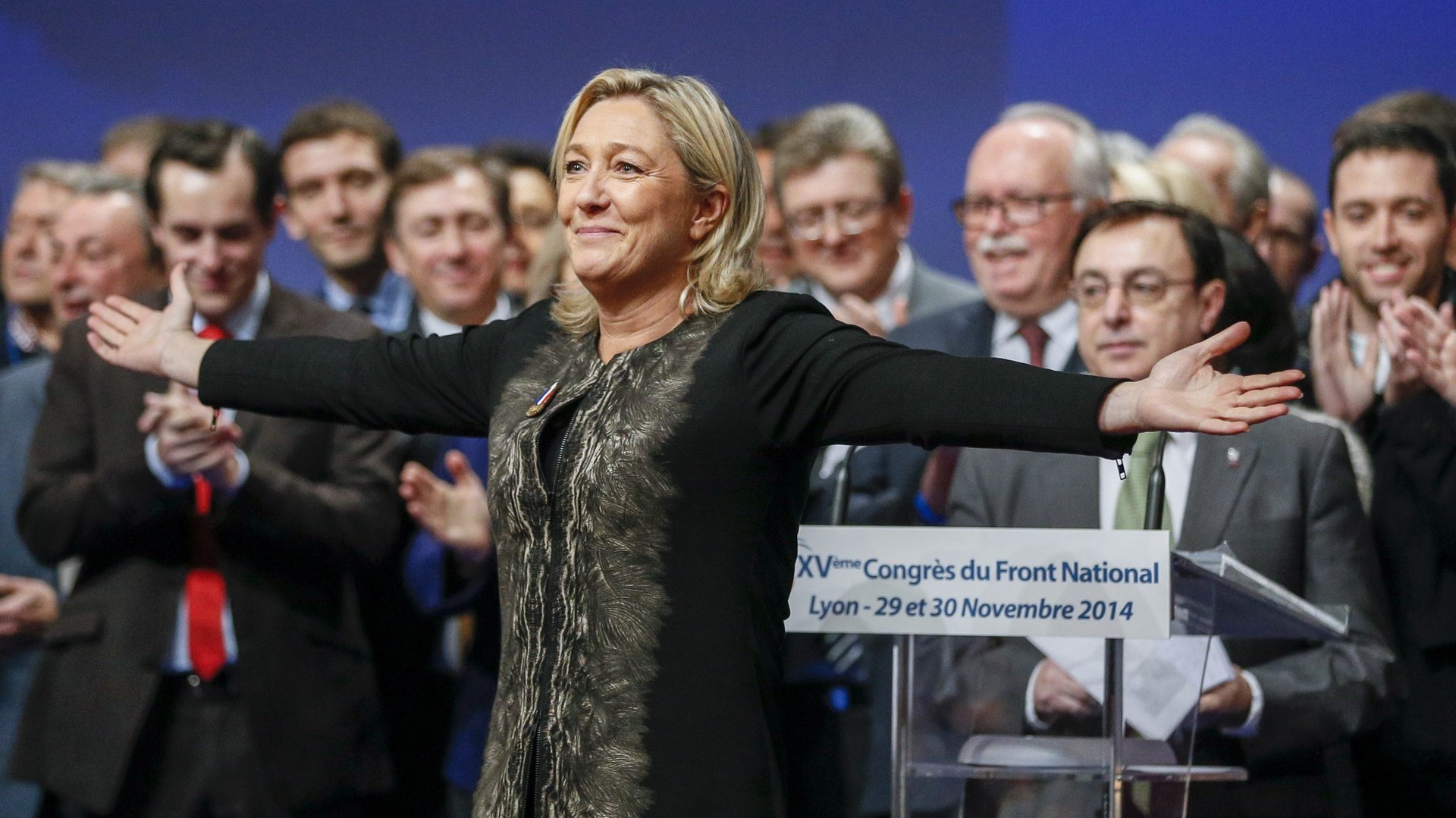Marine Le Pen’s plan to lure French women to the far right is working
The far right has a woman problem. A leading Dutch political scientist once famously described populist radical right parties in Europe as “genuine Mannerparteien” (men’s parties), given that their support base is overwhelmingly skewed toward men.


The far right has a woman problem. A leading Dutch political scientist once famously described populist radical right parties in Europe as “genuine Mannerparteien” (men’s parties), given that their support base is overwhelmingly skewed toward men.
Austria’s recent presidential election, which began last year, is a prime example. The race, which pitted center-left candidate Alexander Van der Bellen against far right candidate Norbert Hofer, appeared to hinge on a wide gender gap. A sizable majority of women (69% of women aged 29 or under and 60% of women aged between 30 to 59, according to one poll) voted centre-left to beat out far right candidate Hofer. The same poll found 47% of men aged 29 or under and 42% of men aged 30 to 59 voted centre-left.
Polling is often imprecise and inconsistent, but there is a broad consensus among researchers that the support base for far right parties in most of Europe has favored men. The 2009 European Election Studies, a poll of roughly 27,000 people’s stated vote in the European Parliament election, illustrated this trend, with a few exceptions.
To combat this, France’s Marine Le Pen is taking a different tack.
In the run up to her country’s presidential election in May, the leading candidate of the far right party Front National (FN) has refused to wear a headscarf to meet Lebanon’s religious Sunni leader, supported abortion under certain circumstances, and called women’s rights (link in French) a casualty of the migrant crisis. ”I am scared that the migrant crisis signals the beginning of the end of women’s rights,” she said, asserting in the French daily l’Opinion that migrants have sexually assaulted European women.
She pushed this view further in an interview with RTL (link in French) on International Women’s Day. “I defend the right of women against Islamist fundamentalism control…And I am the only candidate to speak about this problem,” she said. Women should “have the right to dress as you want, have the right to go wear you want, put on a skirt, put on shorts.”
Her supporters chimed in on Twitter:
The twice-divorced mother of three’s message, that she will staunchly defend women against Muslims, immigration, and globalization, is gaining traction. Since she took the reins of the FN in 2011 from her father, Jean-Marie, the party has enjoyed broad support from women and men, according a 2015 study published in the journal French Politics. Researcher Nonna Mayer, from Sciences Po (the Paris Institute of Political Studies), drew data from three post-electoral surveys to see whether women came out for Le Pen.
The study found that women were less likely to vote for Jean-Marie Le Pen in the first round of the 2002 election, regardless of age, education, and occupational group. But by the 2012 election, Mayer found exactly the opposite: Gender had no impact—there was no real difference in the electoral support of men and women for Marine Le Pen. In a separate poll, Le Pen lagged slightly behind women in 2012, when 17% of women polled voted for her, compared with 20% of men. A follow poll this year shows Le Pen 26% of voters of both sexes.
All this helped Le Pen achieve a stunning result for the far right by winning 18% of the vote in the first round of the 2012 presidential election—surpassing her father’s previous record for the FN, when Le Pen senior gained 17% of votes in the first run-off. Le Pen is favored to win the first round of the election of the upcoming French presidential election with a notable 27.5% of the vote. (The French presidential election consists of two rounds; if a candidate fails to win more than 50% of the vote in the first round, then the two leading candidates compete in a second round.)
Despite the FN’s recent success, Harteveld points out that “across the board women are more likely to vote for left-wing parties in most advanced democracies.”
This is partly because far-right politicians haven’t embraced feminists ideals, clinging instead to traditional notions of women as spouses and mothers. Others point to the position of women in the labor market. Because many are employed by the public sector in non-manual clerical or services jobs, they are less likely to feel threatened by outsourcing or cheap migrant labor. Men, on the other hand, who are over-represented in manual occupations, particularly in blue-collar jobs, are more likely to feel the pains of globalization.
Eelco Harteveld, a researcher at the University of Amsterdam, who focuses on the relationship between gender and the populist radical right, says Le Pen’s success with women has been in reducing the stigma with voting far right.
Harteveld’s research suggested women were less likely to support a party that was stigmatized by others. “Using women’s rights and equality as a discourse surrounding FN’s nativist core message is likely to help,” he said. “For some, including many women, it reduces the signal that voting for FN is not at all acceptable.”
In breaking with her father’s extremist vision of the party, Le Pen has broken from anti-Semitic and homophobic views, while embracing historically left-wing causes, including gay and women’s rights. In doing so, the FN has become less menacing, according to an annual barometer (link in French) of the far-right party; French voters that saw the party as a “danger for democracy” dropped from a peak of 75% the late 1990s to 54% in 2015.
Other far right politicians across Europe are following suit, embracing the pro-women, pro-LGBT, anti-immigrant stance that carried Donald Trump into the US White House. For countries like Germany and the Netherlands with elections forthcoming, Le Pen offers a closer template.